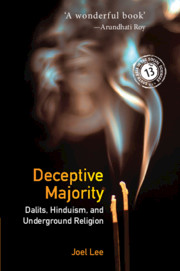7 - Lal Beg Underground: Taqiyya, Ethical Secrecy, and the Pleasure of Dissimulation
Published online by Cambridge University Press: 15 February 2021
Summary
Another Time, Another Place
Lal Beg appears to be dead. That is, a multitude of signs are available that elicit the interpretant “Lal Beg is dead. The tradition of Dalit religious autonomy he represented is a forgotten thing of the past.” Such signs include scholarly exposition. In his book Bālmīki Jayantī aur Bhangī Jātiyāṅ, Bhagwan Das (2007: 18–24) provides a valuable account of the Lal Begi religion. Das's account is entirely in the past habitual tense—it describes what the sanitation labor castes used to do. In his social history of the sanitation labor castes in Delhi, Vijay Prashad learns of a mid-twentieth century text written by a Dalit activist who reclaims the spirit of the oral traditions of the nineteenth century, valorizing Lal Beg alongside the radical Chandal Balmik. Prashad (2000: 99) notes that the last copy of the text was lost in the 1960s, and proposes that we understand “that loss as a metaphor for the disappearance of the tradition of the radical Bala Shah [that is, Lal Beg] who boldly castigated the powerful.” Other signs of the prophet's death include the complete absence of the term “Lal Begi” in public fora on the problems faced by the community formerly known by that name. At rallies, marches, seminars, and conferences addressing manual scavenging and caste discrimination against sanitation workers, one hears nothing of the antinomian prophet or of the sanitation labor castes as his followers (or even ex-followers). Blank looks and expressions of non-comprehension are also such signs. In my years working with Dalit advocacy organizations I sometimes asked co-workers about this figure about whom I was reading in the colonial archive. “Lal who?” was often the response. When I elaborated, my colleagues in the Dalit rights movement cautioned me that Balmikis, far from retaining any tradition of religious difference, were on the whole enthusiastic exponents of Hinduism; Ambedkar's critical Buddhism, they told me, was largely lost on the sanitation labor castes, who had fallen for the seductions of majoritarian inclusion—“fascinating Hindutva,” in Badri's Narayan's (2009) evocative phrase—harder than had other major Dalit castes. If they had produced some red-clad saint or Sufi back in the Mughal period, there was no sign of him now.
- Type
- Chapter
- Information
- Deceptive MajorityDalits, Hinduism, and Underground Religion, pp. 253 - 290Publisher: Cambridge University PressPrint publication year: 2021



